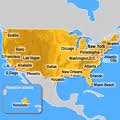The Democratization of Banking: Why Is Socialism Doing So Darn Well in Deep-Red North Dakota?

By Les Leopold
North Dakota is the very definition of a red state. It voted 58 percent to 39 percent for Romney over Obama, and its statehouse and senate have a total of 104 Republicans and only 47 Democrats. The Republican super-majority is so conservative it recently passed the nation’s most severe anti-abortion resolution – a measure that declares a fertilized human egg has the same right to life as a fully formed person.
But North Dakota is also red in another sense: it fully supports its state-owned Bank of North Dakota (BND), a socialist relic that exists nowhere else in America. Why is financial socialism still alive in North Dakota? Why haven’t the North Dakotan free-market crusaders slain it dead?
Because it works.
In 1919, the Non-Partisan League, a vibrant populist organization, won a majority in the legislature and voted the bank into existence. The goal was to free North Dakota farmers from impoverishing debt dependence on the big banks in the Twin Cities, Chicago and New York. More than 90 years later, this state-owned bank is thriving as it helps the state’s community banks, businesses, consumers and students obtain loans at reasonable rates. It also delivers a handsome profit to its owners — the 700,000 residents of North Dakota. In 2011, the BND provided more than $70 million to the state’s coffers. Extrapolate that profit-per-person to a big state like California and you’re looking at an extra $3.8 billion a year in state revenues that could be used to fund education and infrastructure.
One of America’s Best Kept Secrets
Each time we pay our state and local taxes — and all manner of fees — the state deposits those revenues in a bank. If you’re in any state but North Dakota, nearly all of these deposits end up in Wall Street’s too-big to-fail banks, because those banks are the only entities large enough to handle the load. The vast majority of the nation’s 7,000 community banks are too small to provide the array of cash management services that state and local governments require. We’re talking big bucks; at least $1 trillion of our local tax dollars find their way to Wall Street banks, according to Marc Armstrong, executive director of the Public Banking Institute.
So, not only are we, as taxpayers, on the hook for too-big-to-fail Wall Street banks, but we also end up giving our tax dollars to these same banks each and every time we pay a sales tax or property tax or buy a fishing license. In North Dakota, however, all that public revenue runs through its public state bank, which in turn reinvests in the state’s small businesses and public infrastructure via partnerships with 80 small community banks.
How the State Bank Creates Jobs
Banks are supposed to serve as intermediaries that turn our savings and checking deposits into productive loans to businesses and consumers. That’s how jobs are supported and created. But the BND, a state agency, goes one step further. Through its Partnership in Assisting Community Expansion, for example, it provides loans at below-market interest rates to businesses if and only if those businesses create at least one job for every $100,000 loaned. If the $1 trillion that now flows to Wall Street instead were deposited in public state banks in all 50 states using this same approach, up to 10 million new jobs could be created. That would effectively end our destructive unemployment crisis.
No Bailouts for the BND
Banking doesn’t have to be a casino. It doesn’t have to be designed to create gambling opportunities so bank traders and executives can make seven- and eight-figure salaries. As BND president Eric Hardmeyer said in a 2009 Mother Jones interview.


